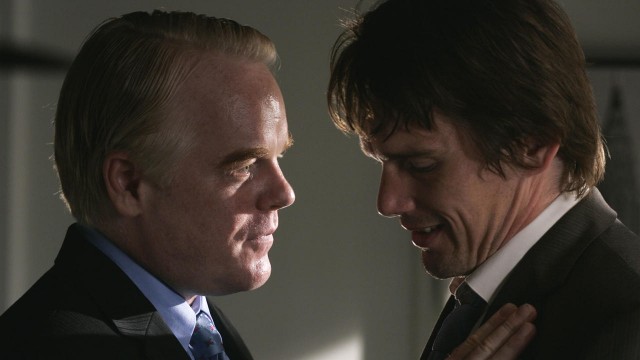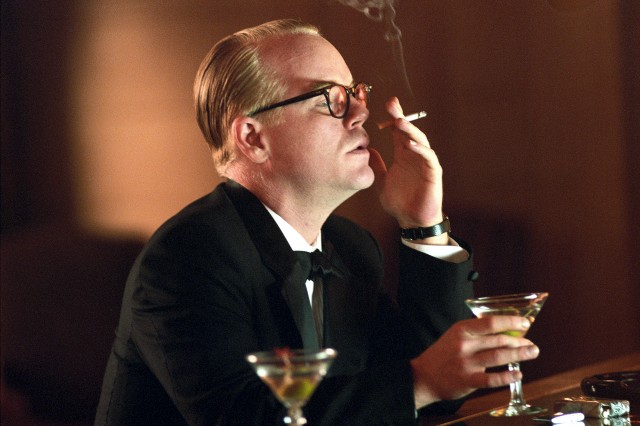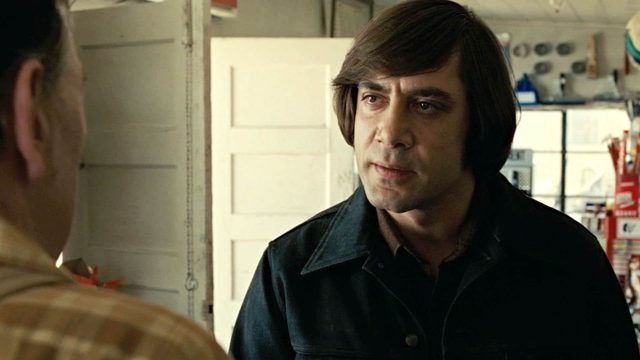
Javier Bardem stars as a mop-topped killer for the ages in No Country for Old Men
NO COUNTRY FOR OLD MEN (Joel & Ethan Coen, 2007)
MoMA Film, Museum of Modern Art
11 West 53rd St. between Fifth & Sixth Aves.
Wednesday, November 29, 1:30
Series runs November 15 – December 29 at 1:30
212-708-9400
www.moma.org
 For more than thirty years, Joel and Ethan Coen have been capturing the American zeitgeist like no one else, penetrating deep into the psyche of the country as well as the history of cinema. MoMA is honoring the pair in their Modern Matinees series, screening fifteen of their films at 1:30 through December 29. Based on the novel by Cormac McCarthy, the Coen brothers’ No Country for Old Men is a gripping thriller dominated by the mesmerizing performance of Javier Bardem as Anton Chigurh, a psychopathic killer who believes in chance. When Llewelyn Moss (an outstanding Josh Brolin) accidentally stumbles upon the site of a drug deal gone terribly wrong, he walks away with a satchel of cash and the dream of making a better life for him and his wife (Kelly MacDonald). He also knows that there will be a lot of people looking for him — and the two million bucks he has absconded with. On his trail are the Mexican dealers who were ripped off, bounty hunter Carson Wells (Woody Harrelson), and the cool, calm Chigurh, who leaves a bloody path of violence in his wake. Meanwhile, Sheriff Bell (Tommy Lee Jones) philosophizes on the sorry state of the modern world as he follows the proceedings with an almost Zen-like precision. Though it struggles to reach its conclusion, No Country for Old Men is an intense noir Western, an epic meditation on chance in which the flip of a coin can be the difference between life and a horrible death. No Country for Old Men is screening at MoMA on November 29; the series features the below films as well as Fargo, Intolerable Cruelty, Blood Simple, Raising Arizona, Miller’s Crossing, Barton Fink, and The Hudsucker Proxy.
For more than thirty years, Joel and Ethan Coen have been capturing the American zeitgeist like no one else, penetrating deep into the psyche of the country as well as the history of cinema. MoMA is honoring the pair in their Modern Matinees series, screening fifteen of their films at 1:30 through December 29. Based on the novel by Cormac McCarthy, the Coen brothers’ No Country for Old Men is a gripping thriller dominated by the mesmerizing performance of Javier Bardem as Anton Chigurh, a psychopathic killer who believes in chance. When Llewelyn Moss (an outstanding Josh Brolin) accidentally stumbles upon the site of a drug deal gone terribly wrong, he walks away with a satchel of cash and the dream of making a better life for him and his wife (Kelly MacDonald). He also knows that there will be a lot of people looking for him — and the two million bucks he has absconded with. On his trail are the Mexican dealers who were ripped off, bounty hunter Carson Wells (Woody Harrelson), and the cool, calm Chigurh, who leaves a bloody path of violence in his wake. Meanwhile, Sheriff Bell (Tommy Lee Jones) philosophizes on the sorry state of the modern world as he follows the proceedings with an almost Zen-like precision. Though it struggles to reach its conclusion, No Country for Old Men is an intense noir Western, an epic meditation on chance in which the flip of a coin can be the difference between life and a horrible death. No Country for Old Men is screening at MoMA on November 29; the series features the below films as well as Fargo, Intolerable Cruelty, Blood Simple, Raising Arizona, Miller’s Crossing, Barton Fink, and The Hudsucker Proxy.
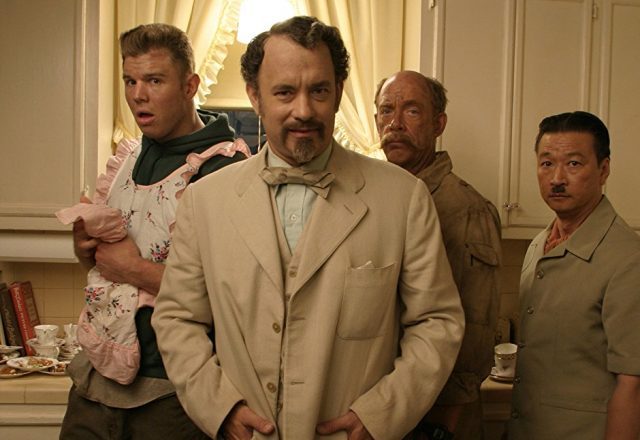
Tom Hanks, J. K. Simmmons et al. should have known better when remaking classic Ealing comedy
THE LADYKILLERS (Joel & Ethan Coen, 2004)
Friday, November 24, 1:30
www.moma.org
 By far the worst film the Coen brothers have ever made, this remake of the classic 1955 Alexander Mackendrick caper comedy is a travesty from start to finish, an absolute embarrassment to all involved, including Tom Hanks, Irma P. Hall, Marlon Wayans, J. K. Simmons, Tzi Ma, Ryan Hurst, and Diane Delano. Did anyone actually watch this film before they released it? We barely smiled once and never laughed at this ridiculous story of a group of losers using a woman’s root cellar as home base to rob a riverboat casino. Besides not being the slightest bit funny, the movie is also racist, as every black actor in the film is playing a stereotype. We get the Coens, but we don’t get this. Was it meant to be ironic? Cynical? Slapstick? All we know is that it’s just plain awful. The Ladykillers is screening at MoMA November 24.
By far the worst film the Coen brothers have ever made, this remake of the classic 1955 Alexander Mackendrick caper comedy is a travesty from start to finish, an absolute embarrassment to all involved, including Tom Hanks, Irma P. Hall, Marlon Wayans, J. K. Simmons, Tzi Ma, Ryan Hurst, and Diane Delano. Did anyone actually watch this film before they released it? We barely smiled once and never laughed at this ridiculous story of a group of losers using a woman’s root cellar as home base to rob a riverboat casino. Besides not being the slightest bit funny, the movie is also racist, as every black actor in the film is playing a stereotype. We get the Coens, but we don’t get this. Was it meant to be ironic? Cynical? Slapstick? All we know is that it’s just plain awful. The Ladykillers is screening at MoMA November 24.
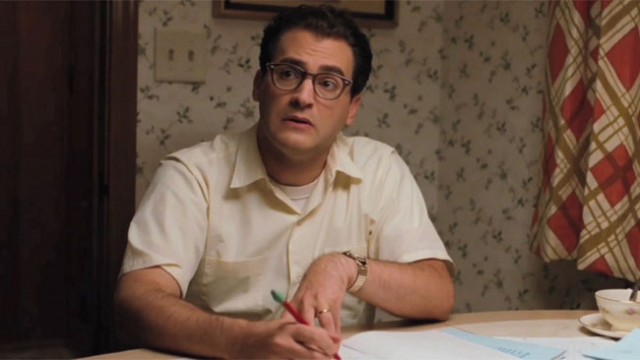
Larry Gopnik (Michael Stuhlbarg) is one serious man in underrated Coen brothers film
A SERIOUS MAN (Joel & Ethan Coen, 2009)
Thursday, November 30, and Thursday, December 28, 1:30
www.moma.org
focusfeatures.com
 The Coens take their unique brand of dry, black comedy to a whole new level with A Serious Man. Poor Larry Gopnik (a remarkably even-keeled Michael Stuhlbarg) just keeps getting dumped on: His wife, Judith (Sari Lennick), wants to leave him for, of all people, touchy-feely Sy Ableman (Fred Melamed); his brother, Arthur (Richard Kind), keeps hogging the bathroom so he can drain his cyst; his son, Danny (Aaron Wolf), won’t stop complaining that F-Troop isn’t coming in clearly and is constantly on the run from the school drug dealer (Jon Kaminsky Jr.); his daughter, Sarah (Jessica McManus), wants to get a nose job; one of his students (David Kang) has bribed him for a passing grade; his possible tenure appears to be in jeopardy; and he gets no help at all from a series of funnier and funnier rabbis. But Larry keeps on keepin’ on in the Jewish suburbs of Minnesota in 1967, trying to make a go of it as his woes pile higher and higher. Joel and Ethan Coen have crafted one of their best tales yet, nailing the look and feel of the era, from Hebrew school to Bar Mitzvah practice, from office jobs to parking lots, from the Columbia Record Club to transistor radios, from television antennas to the naked neighbor next door. The Coens get so many things right, you won’t mind the handful of mistakes in the film, and because it’s the Coens, who’s to say at least some of those errors weren’t intentional? A Serious Man is a seriously great film, made by a pair of seriously great filmmakers. And while you don’t have to be Jewish and from Minnesota to fall in love with it, it sure can’t hurt.
The Coens take their unique brand of dry, black comedy to a whole new level with A Serious Man. Poor Larry Gopnik (a remarkably even-keeled Michael Stuhlbarg) just keeps getting dumped on: His wife, Judith (Sari Lennick), wants to leave him for, of all people, touchy-feely Sy Ableman (Fred Melamed); his brother, Arthur (Richard Kind), keeps hogging the bathroom so he can drain his cyst; his son, Danny (Aaron Wolf), won’t stop complaining that F-Troop isn’t coming in clearly and is constantly on the run from the school drug dealer (Jon Kaminsky Jr.); his daughter, Sarah (Jessica McManus), wants to get a nose job; one of his students (David Kang) has bribed him for a passing grade; his possible tenure appears to be in jeopardy; and he gets no help at all from a series of funnier and funnier rabbis. But Larry keeps on keepin’ on in the Jewish suburbs of Minnesota in 1967, trying to make a go of it as his woes pile higher and higher. Joel and Ethan Coen have crafted one of their best tales yet, nailing the look and feel of the era, from Hebrew school to Bar Mitzvah practice, from office jobs to parking lots, from the Columbia Record Club to transistor radios, from television antennas to the naked neighbor next door. The Coens get so many things right, you won’t mind the handful of mistakes in the film, and because it’s the Coens, who’s to say at least some of those errors weren’t intentional? A Serious Man is a seriously great film, made by a pair of seriously great filmmakers. And while you don’t have to be Jewish and from Minnesota to fall in love with it, it sure can’t hurt.
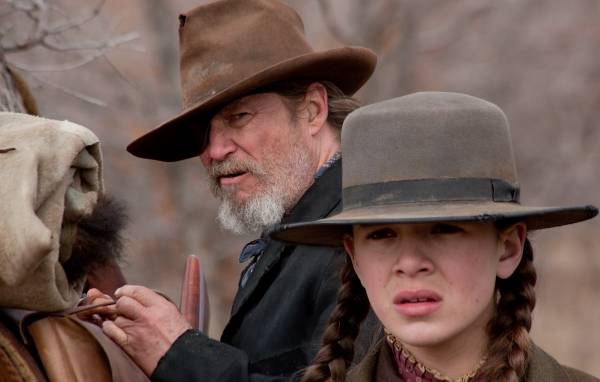
Jeff Bridges and Hailee Steinfeld star in Coen brothers remake of John Wayne classic
TRUE GRIT (Joel & Ethan Coen, 2010)
Friday, December 1, and Friday, December 29, 1:30
www.moma.org
www.truegritmovie.com
 Since their 1984 debut feature, Blood Simple, Coen brothers Joel and Ethan have tackled numerous genres with dazzling originality, resulting in such fresh, unusual, and intelligent fare as Barton Fink (1991), Fargo (1996), The Big Lebowski (1998), No Country for Old Men (2007), and A Serious Man (2009). They’ve had some hiccups along the way, but their only true dud was also their only remake, 2004’s The Ladykillers, an unwatchable version of the 1955 Alec Guinness original. Now they’re revisiting the 1969 classic Western True Grit, which earned John Wayne his only Oscar and has held up poorly over the years. For the 2010 reboot, the Coens turned to Jeff Bridges to step into the Duke’s shoes as U.S. marshal Reuben J. “Rooster” Cogburn, an aging lawman with a thing for the bottle, as well as for killing. He’s hired by determined fourteen-year-old Mattie Ross (Hailee Steinfeld) to hunt down her father’s murderer, a man named Tom Chaney (Josh Brolin), who’s also being tracked by ever-faithful Texas Ranger La Boeuf (Matt Damon) for other crimes against humanity. Instead of merely remaking the previous film, which was directed by Henry Hathaway (Kiss of Death, Airport) and also starred musician Glen Campbell as La Boeuf and Kim Darby as Mattie, the Coens went back to Charles Portis’s 1968 novel, with the most important difference being the change in point of view; the new True Grit is told from Mattie’s perspective, including voice-over narration from the adult Mattie (Elizabeth Marvel), which breathes new life into the tired old horse. While Wayne played Cogburn with his tongue firmly in cheek, adding bits of silly comic relief, Bridges imbues the marshal with more seriousness and less hulking bravado as he continually — and more and more drunkenly — tells stories from his past. By going back to the book, the Coens also get to add more violence, especially near the end, as well as a coda about Mattie’s future. While the original featured a bombastic, overreaching score by Don Black, longtime Coen brothers composer Carter Burwell ratchets things down significantly, using the old hymn “Leaning on the Everlasting Arms” as his central musical theme. As much as the Coens want the new film to be viewed in its own right, there are still too many similarities to avoid comparisons with the original, but their True Grit, which was nominated for ten Oscars and won none, does turn out to be a better executed, less predictable, and more entertaining genre piece. True Grit is screening at MoMA on December 1 and 29.
Since their 1984 debut feature, Blood Simple, Coen brothers Joel and Ethan have tackled numerous genres with dazzling originality, resulting in such fresh, unusual, and intelligent fare as Barton Fink (1991), Fargo (1996), The Big Lebowski (1998), No Country for Old Men (2007), and A Serious Man (2009). They’ve had some hiccups along the way, but their only true dud was also their only remake, 2004’s The Ladykillers, an unwatchable version of the 1955 Alec Guinness original. Now they’re revisiting the 1969 classic Western True Grit, which earned John Wayne his only Oscar and has held up poorly over the years. For the 2010 reboot, the Coens turned to Jeff Bridges to step into the Duke’s shoes as U.S. marshal Reuben J. “Rooster” Cogburn, an aging lawman with a thing for the bottle, as well as for killing. He’s hired by determined fourteen-year-old Mattie Ross (Hailee Steinfeld) to hunt down her father’s murderer, a man named Tom Chaney (Josh Brolin), who’s also being tracked by ever-faithful Texas Ranger La Boeuf (Matt Damon) for other crimes against humanity. Instead of merely remaking the previous film, which was directed by Henry Hathaway (Kiss of Death, Airport) and also starred musician Glen Campbell as La Boeuf and Kim Darby as Mattie, the Coens went back to Charles Portis’s 1968 novel, with the most important difference being the change in point of view; the new True Grit is told from Mattie’s perspective, including voice-over narration from the adult Mattie (Elizabeth Marvel), which breathes new life into the tired old horse. While Wayne played Cogburn with his tongue firmly in cheek, adding bits of silly comic relief, Bridges imbues the marshal with more seriousness and less hulking bravado as he continually — and more and more drunkenly — tells stories from his past. By going back to the book, the Coens also get to add more violence, especially near the end, as well as a coda about Mattie’s future. While the original featured a bombastic, overreaching score by Don Black, longtime Coen brothers composer Carter Burwell ratchets things down significantly, using the old hymn “Leaning on the Everlasting Arms” as his central musical theme. As much as the Coens want the new film to be viewed in its own right, there are still too many similarities to avoid comparisons with the original, but their True Grit, which was nominated for ten Oscars and won none, does turn out to be a better executed, less predictable, and more entertaining genre piece. True Grit is screening at MoMA on December 1 and 29.

Oscar Isaac has to see a man about a cat in the Coen brothers’ Inside Llewyn Davis
INSIDE LLEWYN DAVIS (Joel & Ethan Coen, 2013)
Wednesday, December 6, 1:30
www.moma.org
www.insidellewyndavis.com
 Over the years, Joel and Ethan Coen have created a slew of offbeat protagonists and antiheroes who trudge through surreal life experiences, from the McDunnoughs in Raising Arizona and Tom Reagan in Miller’s Crossing to the title character in Barton Fink and Anton Chigurth in No Country for Old Men. But they have come up with their most despicable — and most believable — main character in Inside Llewyn Davis. The previously little-known Oscar Isaac gives a career-defining performance as Llewyn Davis, a selfish wastrel who mistreats everyone he meets. A broke singer-songwriter in 1961 Greenwich Village whose former partner (voiced on record by Marcus Mumford) killed himself, Davis loses a mentor’s (Ethan Phillips) cat, curses out his agent (Jerry Grayson), impregnates a married friend (Carey Mulligan), makes fun of the husband’s (Justin Timberlake) new song, avoids visiting his ailing father (Stan Carp), insults a portly jazzman (John Goodman) — essentially, he meets every situation by insulting someone, then turning and walking away, without even the slightest hint of regret. And the beautiful thing is, the Coens aren’t about to offer him redemption. Inspired in part by the life of Dave Von Ronk and with sly references to such other musicians as Ramblin’ Jack Elliott, Tom Paxton, Dr. John, Doc Pomus, and Jim and Jean along with music impresario Bud Grossman and Gerde’s Folk City, Inside Llewyn Davis is a bitingly funny black comedy about a nasty man living in his own egocentric world, refusing to share any part of himself with anyone else, through his music or face-to-face, even though people keep giving him opportunity after opportunity. And the audience is in on it too, wanting him to succeed despite his myriad offenses. The soundtrack, overseen by T Bone Burnett, who previously worked with the Coens on O Brother, Where Art Thou? brings it all back home, with such highlights as Isaac’s performance of “Hang Me, Oh Hang Me,” Timberlake, Mulligan, and Stark Sands teaming up on “Five Hundred Miles,” and Timberlake, Davis, and Girls hunk Adam Driver all having fun with an updated version of “Please Mr. Kennedy.” Inside Llewyn Davis is being shown at MoMA on December 6.
Over the years, Joel and Ethan Coen have created a slew of offbeat protagonists and antiheroes who trudge through surreal life experiences, from the McDunnoughs in Raising Arizona and Tom Reagan in Miller’s Crossing to the title character in Barton Fink and Anton Chigurth in No Country for Old Men. But they have come up with their most despicable — and most believable — main character in Inside Llewyn Davis. The previously little-known Oscar Isaac gives a career-defining performance as Llewyn Davis, a selfish wastrel who mistreats everyone he meets. A broke singer-songwriter in 1961 Greenwich Village whose former partner (voiced on record by Marcus Mumford) killed himself, Davis loses a mentor’s (Ethan Phillips) cat, curses out his agent (Jerry Grayson), impregnates a married friend (Carey Mulligan), makes fun of the husband’s (Justin Timberlake) new song, avoids visiting his ailing father (Stan Carp), insults a portly jazzman (John Goodman) — essentially, he meets every situation by insulting someone, then turning and walking away, without even the slightest hint of regret. And the beautiful thing is, the Coens aren’t about to offer him redemption. Inspired in part by the life of Dave Von Ronk and with sly references to such other musicians as Ramblin’ Jack Elliott, Tom Paxton, Dr. John, Doc Pomus, and Jim and Jean along with music impresario Bud Grossman and Gerde’s Folk City, Inside Llewyn Davis is a bitingly funny black comedy about a nasty man living in his own egocentric world, refusing to share any part of himself with anyone else, through his music or face-to-face, even though people keep giving him opportunity after opportunity. And the audience is in on it too, wanting him to succeed despite his myriad offenses. The soundtrack, overseen by T Bone Burnett, who previously worked with the Coens on O Brother, Where Art Thou? brings it all back home, with such highlights as Isaac’s performance of “Hang Me, Oh Hang Me,” Timberlake, Mulligan, and Stark Sands teaming up on “Five Hundred Miles,” and Timberlake, Davis, and Girls hunk Adam Driver all having fun with an updated version of “Please Mr. Kennedy.” Inside Llewyn Davis is being shown at MoMA on December 6.
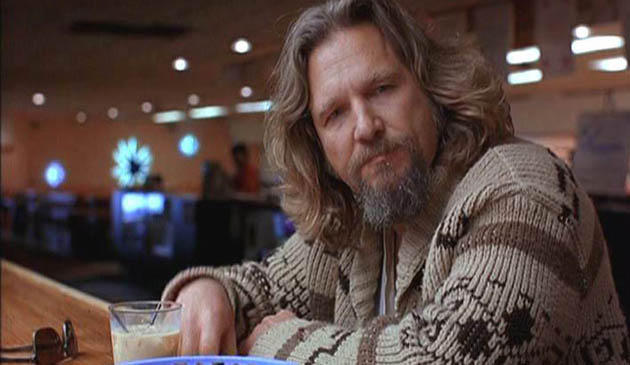
Jeff Bridges plays the ultimate stoner, the Dude, in Coen brothers cult classic
THE BIG LEBOWSKI (Joel & Ethan Coen, 1998)
Thursday, December 21, 1:30
www.moma.org
 One of the ultimate cult classics and the best bowling movie ever, the Coen brothers’ The Big Lebowski has built up such a following since its 1998 release that fans now gather every year for Lebowski Fest, where they honor all things Dude, and with good reason. The Big Lebowski is an intricately weaved gem that is made up of set pieces that come together in magically insane ways. Jeff Bridges is awesome as the Dude, a laid-back cool cat who gets sucked into a noirish plot of jealousy, murder, money, mistaken identity, and messy carpets. Julianne Moore is excellent as free spirit Maude, Tara Reid struts her stuff as Bunny, and Peter Stormare, Flea, and Torsten Voges are a riot as a trio of nihilists. Also on hand are Philip Seymour Hoffman, David Huddleston, Aimee Mann, Jimmie Dale Gilmore, David Thewlis, Sam Elliott, Ben Gazzara, Jon Polito, and other crazy characters, but the film really belongs to the Dude and his fellow bowlers Jesus Quintana (John Turturro, who is so dirty he is completely cut out of the television version), Donny (Steve Buscemi), and Walter (John Goodman), who refuses to roll on Shabbos. And through it all, one thing always holds true: The Dude abides. The Big Lebowski is screening at MoMA on December 21.
One of the ultimate cult classics and the best bowling movie ever, the Coen brothers’ The Big Lebowski has built up such a following since its 1998 release that fans now gather every year for Lebowski Fest, where they honor all things Dude, and with good reason. The Big Lebowski is an intricately weaved gem that is made up of set pieces that come together in magically insane ways. Jeff Bridges is awesome as the Dude, a laid-back cool cat who gets sucked into a noirish plot of jealousy, murder, money, mistaken identity, and messy carpets. Julianne Moore is excellent as free spirit Maude, Tara Reid struts her stuff as Bunny, and Peter Stormare, Flea, and Torsten Voges are a riot as a trio of nihilists. Also on hand are Philip Seymour Hoffman, David Huddleston, Aimee Mann, Jimmie Dale Gilmore, David Thewlis, Sam Elliott, Ben Gazzara, Jon Polito, and other crazy characters, but the film really belongs to the Dude and his fellow bowlers Jesus Quintana (John Turturro, who is so dirty he is completely cut out of the television version), Donny (Steve Buscemi), and Walter (John Goodman), who refuses to roll on Shabbos. And through it all, one thing always holds true: The Dude abides. The Big Lebowski is screening at MoMA on December 21.
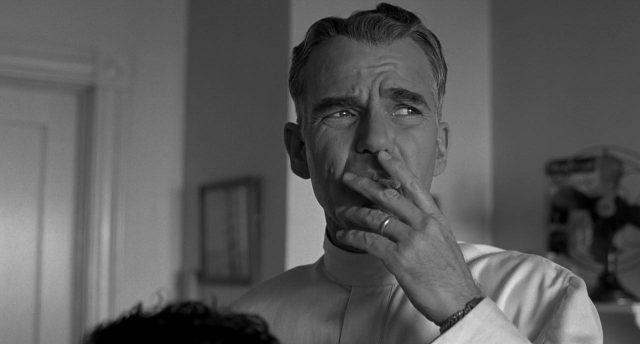
Billy Bob Thornton stars as the title character in the Coen brothers’ The Man Who Wasn’t There
THE MAN WHO WASN’T THERE (Joel Coen, 2001)
Wednesday, December 27, 1:30
www.moma.org
 The first half of this Coen brothers movie is stupendous. Shot in color by Roger Deakins and processed in magnificent black and white to get a richer palette, the film tells the story of Ed Crane, Billy Bob Thornton’s best role yet, a barber with almost nothing to say — ever. When he does talk, he talks slow, slower than he walks. Even his voice-over narration is delivered in a slow monotone. For about forty-five minutes, the pace is fabulous, but then it begins wearing down as the plot goes all over the place. It feels like the Coens had a bunch of different film ideas and decided to throw them all into the last hour of this movie, which seems to go on and on and on and on, with at least four places where you’ll think it’s over. The laughs go away, and a creepy, unfriendly moodiness pervades. At least you can still keep track of the awesome wigs that many of the male characters wear, and for the Californians out there it might be fun guessing the shooting locations, because much of the film was not shot on studio sets. Locations include Musso and Frank’s, a Presbyterian church on Wilshire Blvd., an empty Bank of America branch in Los Angeles, an abandoned furniture store in Glendale, Bungalow Heaven and Castle Green in Pasadena, and the streets of Orange in Orange County. The rather remarkable cast also includes Frances McDormand, Michael Badalucco, Richard Jenkins, Scarlett Johansson, Jon Polito, Tony Shalhoub, and James Gandolfini. The Man Who Wasn’t There is screening December 27 at MoMA.
The first half of this Coen brothers movie is stupendous. Shot in color by Roger Deakins and processed in magnificent black and white to get a richer palette, the film tells the story of Ed Crane, Billy Bob Thornton’s best role yet, a barber with almost nothing to say — ever. When he does talk, he talks slow, slower than he walks. Even his voice-over narration is delivered in a slow monotone. For about forty-five minutes, the pace is fabulous, but then it begins wearing down as the plot goes all over the place. It feels like the Coens had a bunch of different film ideas and decided to throw them all into the last hour of this movie, which seems to go on and on and on and on, with at least four places where you’ll think it’s over. The laughs go away, and a creepy, unfriendly moodiness pervades. At least you can still keep track of the awesome wigs that many of the male characters wear, and for the Californians out there it might be fun guessing the shooting locations, because much of the film was not shot on studio sets. Locations include Musso and Frank’s, a Presbyterian church on Wilshire Blvd., an empty Bank of America branch in Los Angeles, an abandoned furniture store in Glendale, Bungalow Heaven and Castle Green in Pasadena, and the streets of Orange in Orange County. The rather remarkable cast also includes Frances McDormand, Michael Badalucco, Richard Jenkins, Scarlett Johansson, Jon Polito, Tony Shalhoub, and James Gandolfini. The Man Who Wasn’t There is screening December 27 at MoMA.


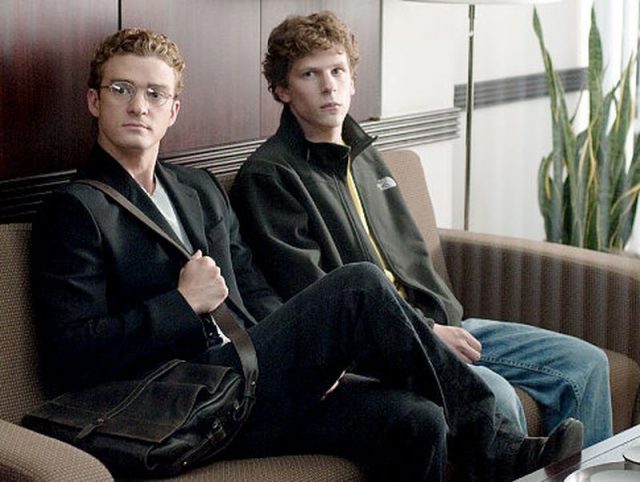
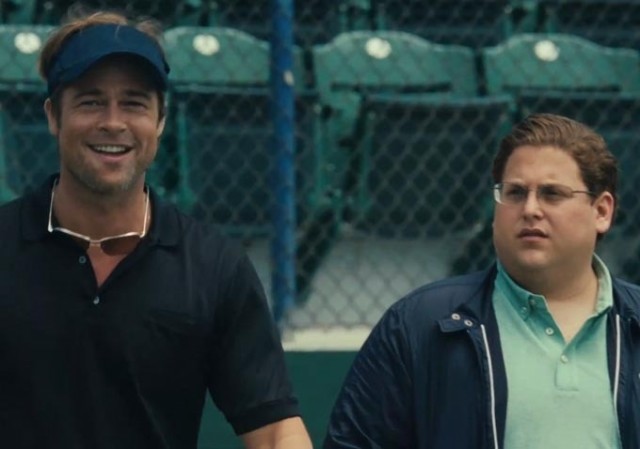
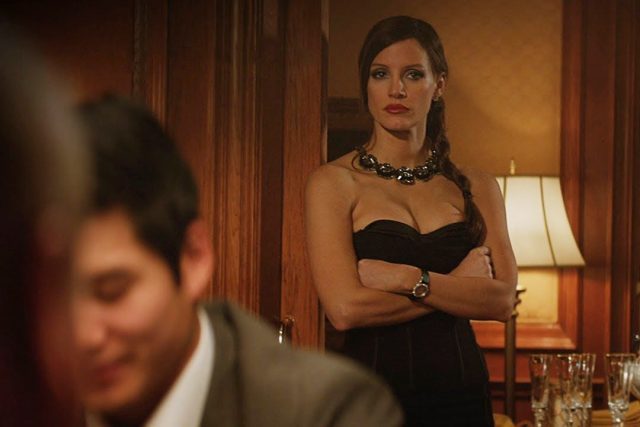
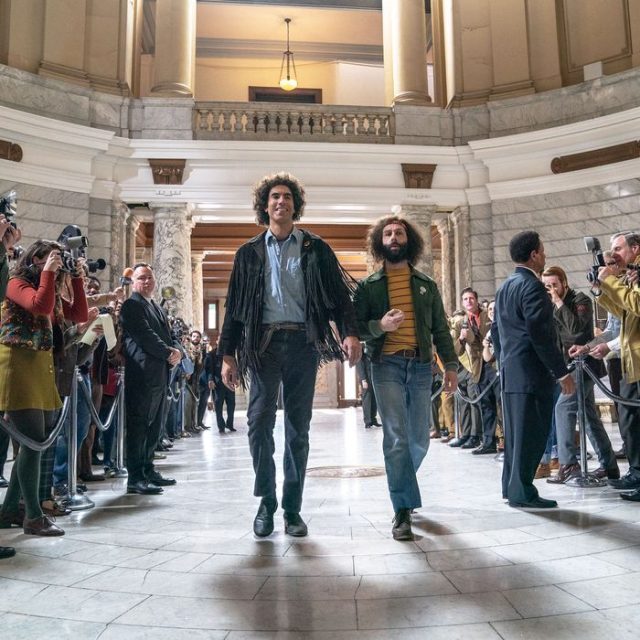

 For more than thirty years, Joel and Ethan Coen have been capturing the American zeitgeist like no one else, penetrating deep into the psyche of the country as well as the history of cinema. MoMA is honoring the pair in their Modern Matinees series, screening fifteen of their films at 1:30 through December 29. Based on the novel by Cormac McCarthy, the Coen brothers’ No Country for Old Men is a gripping thriller dominated by the mesmerizing performance of Javier Bardem as Anton Chigurh, a psychopathic killer who believes in chance. When Llewelyn Moss (an outstanding Josh Brolin) accidentally stumbles upon the site of a drug deal gone terribly wrong, he walks away with a satchel of cash and the dream of making a better life for him and his wife (Kelly MacDonald). He also knows that there will be a lot of people looking for him — and the two million bucks he has absconded with. On his trail are the Mexican dealers who were ripped off, bounty hunter Carson Wells (Woody Harrelson), and the cool, calm Chigurh, who leaves a bloody path of violence in his wake. Meanwhile, Sheriff Bell (Tommy Lee Jones) philosophizes on the sorry state of the modern world as he follows the proceedings with an almost Zen-like precision. Though it struggles to reach its conclusion, No Country for Old Men is an intense noir Western, an epic meditation on chance in which the flip of a coin can be the difference between life and a horrible death. No Country for Old Men is screening at MoMA on November 29; the series features the below films as well as Fargo, Intolerable Cruelty, Blood Simple, Raising Arizona, Miller’s Crossing, Barton Fink, and The Hudsucker Proxy.
For more than thirty years, Joel and Ethan Coen have been capturing the American zeitgeist like no one else, penetrating deep into the psyche of the country as well as the history of cinema. MoMA is honoring the pair in their Modern Matinees series, screening fifteen of their films at 1:30 through December 29. Based on the novel by Cormac McCarthy, the Coen brothers’ No Country for Old Men is a gripping thriller dominated by the mesmerizing performance of Javier Bardem as Anton Chigurh, a psychopathic killer who believes in chance. When Llewelyn Moss (an outstanding Josh Brolin) accidentally stumbles upon the site of a drug deal gone terribly wrong, he walks away with a satchel of cash and the dream of making a better life for him and his wife (Kelly MacDonald). He also knows that there will be a lot of people looking for him — and the two million bucks he has absconded with. On his trail are the Mexican dealers who were ripped off, bounty hunter Carson Wells (Woody Harrelson), and the cool, calm Chigurh, who leaves a bloody path of violence in his wake. Meanwhile, Sheriff Bell (Tommy Lee Jones) philosophizes on the sorry state of the modern world as he follows the proceedings with an almost Zen-like precision. Though it struggles to reach its conclusion, No Country for Old Men is an intense noir Western, an epic meditation on chance in which the flip of a coin can be the difference between life and a horrible death. No Country for Old Men is screening at MoMA on November 29; the series features the below films as well as Fargo, Intolerable Cruelty, Blood Simple, Raising Arizona, Miller’s Crossing, Barton Fink, and The Hudsucker Proxy.
 By far the worst film the Coen brothers have ever made, this remake of the classic 1955 Alexander Mackendrick caper comedy is a travesty from start to finish, an absolute embarrassment to all involved, including Tom Hanks, Irma P. Hall, Marlon Wayans, J. K. Simmons, Tzi Ma, Ryan Hurst, and Diane Delano. Did anyone actually watch this film before they released it? We barely smiled once and never laughed at this ridiculous story of a group of losers using a woman’s root cellar as home base to rob a riverboat casino. Besides not being the slightest bit funny, the movie is also racist, as every black actor in the film is playing a stereotype. We get the Coens, but we don’t get this. Was it meant to be ironic? Cynical? Slapstick? All we know is that it’s just plain awful. The Ladykillers is screening at MoMA November 24.
By far the worst film the Coen brothers have ever made, this remake of the classic 1955 Alexander Mackendrick caper comedy is a travesty from start to finish, an absolute embarrassment to all involved, including Tom Hanks, Irma P. Hall, Marlon Wayans, J. K. Simmons, Tzi Ma, Ryan Hurst, and Diane Delano. Did anyone actually watch this film before they released it? We barely smiled once and never laughed at this ridiculous story of a group of losers using a woman’s root cellar as home base to rob a riverboat casino. Besides not being the slightest bit funny, the movie is also racist, as every black actor in the film is playing a stereotype. We get the Coens, but we don’t get this. Was it meant to be ironic? Cynical? Slapstick? All we know is that it’s just plain awful. The Ladykillers is screening at MoMA November 24.
 The Coens take their unique brand of dry, black comedy to a whole new level with A Serious Man. Poor Larry Gopnik (a remarkably even-keeled Michael Stuhlbarg) just keeps getting dumped on: His wife, Judith (Sari Lennick), wants to leave him for, of all people, touchy-feely Sy Ableman (Fred Melamed); his brother, Arthur (Richard Kind), keeps hogging the bathroom so he can drain his cyst; his son, Danny (Aaron Wolf), won’t stop complaining that F-Troop isn’t coming in clearly and is constantly on the run from the school drug dealer (Jon Kaminsky Jr.); his daughter, Sarah (Jessica McManus), wants to get a nose job; one of his students (David Kang) has bribed him for a passing grade; his possible tenure appears to be in jeopardy; and he gets no help at all from a series of funnier and funnier rabbis. But Larry keeps on keepin’ on in the Jewish suburbs of Minnesota in 1967, trying to make a go of it as his woes pile higher and higher. Joel and Ethan Coen have crafted one of their best tales yet, nailing the look and feel of the era, from Hebrew school to Bar Mitzvah practice, from office jobs to parking lots, from the Columbia Record Club to transistor radios, from television antennas to the naked neighbor next door. The Coens get so many things right, you won’t mind the handful of mistakes in the film, and because it’s the Coens, who’s to say at least some of those errors weren’t intentional? A Serious Man is a seriously great film, made by a pair of seriously great filmmakers. And while you don’t have to be Jewish and from Minnesota to fall in love with it, it sure can’t hurt.
The Coens take their unique brand of dry, black comedy to a whole new level with A Serious Man. Poor Larry Gopnik (a remarkably even-keeled Michael Stuhlbarg) just keeps getting dumped on: His wife, Judith (Sari Lennick), wants to leave him for, of all people, touchy-feely Sy Ableman (Fred Melamed); his brother, Arthur (Richard Kind), keeps hogging the bathroom so he can drain his cyst; his son, Danny (Aaron Wolf), won’t stop complaining that F-Troop isn’t coming in clearly and is constantly on the run from the school drug dealer (Jon Kaminsky Jr.); his daughter, Sarah (Jessica McManus), wants to get a nose job; one of his students (David Kang) has bribed him for a passing grade; his possible tenure appears to be in jeopardy; and he gets no help at all from a series of funnier and funnier rabbis. But Larry keeps on keepin’ on in the Jewish suburbs of Minnesota in 1967, trying to make a go of it as his woes pile higher and higher. Joel and Ethan Coen have crafted one of their best tales yet, nailing the look and feel of the era, from Hebrew school to Bar Mitzvah practice, from office jobs to parking lots, from the Columbia Record Club to transistor radios, from television antennas to the naked neighbor next door. The Coens get so many things right, you won’t mind the handful of mistakes in the film, and because it’s the Coens, who’s to say at least some of those errors weren’t intentional? A Serious Man is a seriously great film, made by a pair of seriously great filmmakers. And while you don’t have to be Jewish and from Minnesota to fall in love with it, it sure can’t hurt.


 The first half of this Coen brothers movie is stupendous. Shot in color by Roger Deakins and processed in magnificent black and white to get a richer palette, the film tells the story of Ed Crane, Billy Bob Thornton’s best role yet, a barber with almost nothing to say — ever. When he does talk, he talks slow, slower than he walks. Even his voice-over narration is delivered in a slow monotone. For about forty-five minutes, the pace is fabulous, but then it begins wearing down as the plot goes all over the place. It feels like the Coens had a bunch of different film ideas and decided to throw them all into the last hour of this movie, which seems to go on and on and on and on, with at least four places where you’ll think it’s over. The laughs go away, and a creepy, unfriendly moodiness pervades. At least you can still keep track of the awesome wigs that many of the male characters wear, and for the Californians out there it might be fun guessing the shooting locations, because much of the film was not shot on studio sets. Locations include Musso and Frank’s, a Presbyterian church on Wilshire Blvd., an empty Bank of America branch in Los Angeles, an abandoned furniture store in Glendale, Bungalow Heaven and Castle Green in Pasadena, and the streets of Orange in Orange County. The rather remarkable cast also includes Frances McDormand, Michael Badalucco, Richard Jenkins, Scarlett Johansson, Jon Polito, Tony Shalhoub, and James Gandolfini. The Man Who Wasn’t There is screening December 27 at MoMA.
The first half of this Coen brothers movie is stupendous. Shot in color by Roger Deakins and processed in magnificent black and white to get a richer palette, the film tells the story of Ed Crane, Billy Bob Thornton’s best role yet, a barber with almost nothing to say — ever. When he does talk, he talks slow, slower than he walks. Even his voice-over narration is delivered in a slow monotone. For about forty-five minutes, the pace is fabulous, but then it begins wearing down as the plot goes all over the place. It feels like the Coens had a bunch of different film ideas and decided to throw them all into the last hour of this movie, which seems to go on and on and on and on, with at least four places where you’ll think it’s over. The laughs go away, and a creepy, unfriendly moodiness pervades. At least you can still keep track of the awesome wigs that many of the male characters wear, and for the Californians out there it might be fun guessing the shooting locations, because much of the film was not shot on studio sets. Locations include Musso and Frank’s, a Presbyterian church on Wilshire Blvd., an empty Bank of America branch in Los Angeles, an abandoned furniture store in Glendale, Bungalow Heaven and Castle Green in Pasadena, and the streets of Orange in Orange County. The rather remarkable cast also includes Frances McDormand, Michael Badalucco, Richard Jenkins, Scarlett Johansson, Jon Polito, Tony Shalhoub, and James Gandolfini. The Man Who Wasn’t There is screening December 27 at MoMA.

